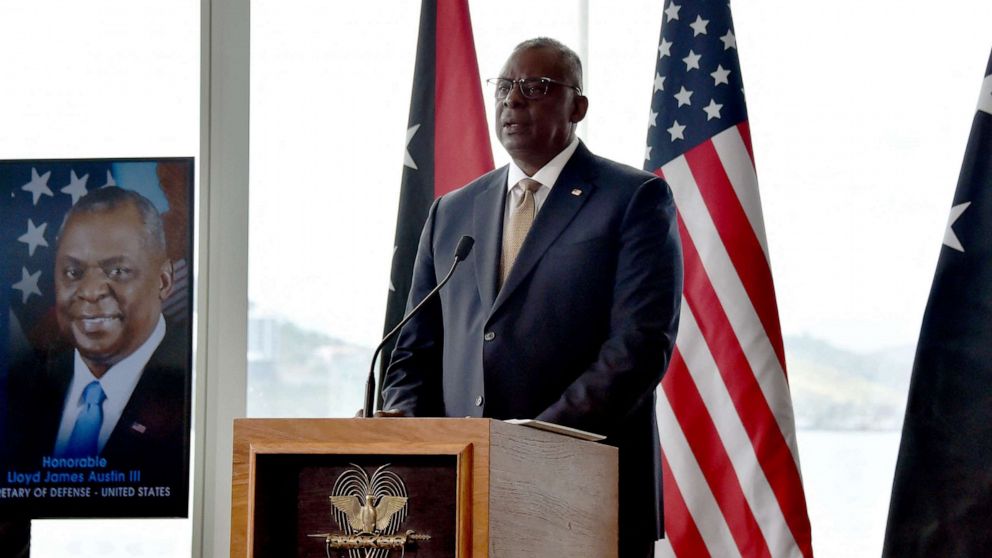作为国防部长劳埃德·奥斯汀周四会见了巴布亚新几内亚的最高领导人在两国于5月签署的新防务合作协议的基础上,奥斯汀强调,美国并不寻求在该岛建立永久基地,而是“确保我们加强巴布亚新几内亚自卫和保护其利益的能力”
今年早些时候的合作协议凸显了美国对这个岛国的战略重要性。这个岛国位于澳大利亚以北,与南太平洋的其他国家一样,与中国有着密切的经济联系。
奥斯汀是第一位访问巴布亚新几内亚的美国国防部长,他的访问表明,在中国去年与邻国所罗门群岛达成安全协议后,美国现在正专注于在该地区建立关系。
奥斯汀周四在首都莫尔兹比港举行的新闻发布会上谈到防御协议时说:“这实际上是为了加强我们确保自由开放的印度-太平洋和保护以规则为基础的国际秩序的能力,我们将继续关注这一点。”。
奥斯汀说:“我们将继续与志同道合的国家以及与我们分享自由开放的印太愿景的国家合作。”。“再一次,我认为[防务协议]反映了我们共同的价值观,而且,这种关系实际上就是这些价值观。”
该协议正在等待巴布亚新几内亚政府的批准,将持续15年,官员们说,该协议将加强两国军队之间的联系,增加巴布亚新几内亚国防部队与美国军队的训练机会,改善军事设施的基础设施,并帮助美国支持该地区未来的人道主义和救灾行动。
虽然该协议没有要求建立永久性的美国基地,但美国官员表示,该协议可能会导致轮换的军事存在。
巴布亚新几内亚总理詹姆斯马拉佩淡化了该协议将加剧与中国紧张关系的说法,巴布亚新几内亚与中国有着密切的经济关系。
马拉佩周四表示:“他们对我们与美国签署协议没有任何意见,他们注意到这样一个事实,即我们与美国拥有一些共同的价值观,而我们与世界上其他国家和防务合作没有共同的价值观。”。
他说:“这是我们与一些国家有意选择的伙伴关系。”。“我们知道这一领域的特权,但我们同样不会损害我们与中国和其他国家的关系...特别是政府与政府、企业与企业的关系。”
他补充说,与中国的关系严格来说是经济关系,中国没有要求与巴布亚新几内亚建立军事关系。

2023年7月27日,美国国防部长劳埃德·奥斯汀在莫尔兹比港与巴布亚新几内亚总理詹姆斯·马拉佩举行的新闻发布会上讲话。
安德鲁·库坦/法新社
在与奥斯汀会面之前,马拉佩告诉记者,他的国家可以与这两个国家合作,而不必选择其中一个。
“我们尊重我们与中国在贸易、经济、商业方面的关系以及我们与中国关系的特殊性,但这不会损害我们与美国的关系——就像我们与美国的关系不会损害我们与中国的关系一样,”他说。
当被问及美国是否可能在未来向巴布亚新几内亚的港口派遣有核能力的船只时,奥斯汀说,美国将尊重巴布亚新几内亚作为无核区的承诺
虽然奥斯汀是第一位访问巴布亚新几内亚的国防部长,但马拉佩指出,他实际上是第二位访问该岛的家庭成员:奥斯汀的父亲,也叫劳埃德,二战期间曾在巴布亚新几内亚服役。
在巴布亚新几内亚停留之后,奥斯汀前往澳大利亚的布里斯班,在那里他和美国国务卿安东尼布林肯将会见澳大利亚外长。
近年来,随着美国和澳大利亚发展了更紧密的安全关系,包括多达2,500名美国海军陆战队队员轮流在澳大利亚北部进行定期训练演习,年度会议变得更加重要,以对抗中国在南中国海的领土主张以及对自治的台湾的挑衅。中国认为台湾是一个分离的省份。
在本周的会议之前,美国国防官员暗示,双边安全协议的扩大可能导致印度-太平洋地区涉及不同军种和能力的额外轮换。
US not seeking permanent new base in Papua New Guinea, Austin says
As Defense Secretary Lloyd Austinmet with Papua New Guinea's top leaders on Thursday, to build on a new defense cooperation agreement signed between the two countries in May, Austin stressed that the U.S. is not seeking permanent basing on the island -- but to "make sure we strengthen PNG's ability to defend itself and protect its interest."
The cooperation agreement earlier this year highlights the strategic importance that the U.S. places on the island nation, which is located north of Australia and, like other nations in the South Pacific, has strong economic ties with China.
Austin is the first U.S. defense secretary to visit Papua New Guinea and his trip is an indication of the focus the U.S. is now placing on building relationships in the region in the wake of a security agreement that China worked out last year with the neighboring Solomon Islands.
"This is really about strengthening our ability to ensure a free and open Indo-Pacific and protecting the rules-based international order, and we will remain focused on that," Austin said of the defense agreement at a news conference Thursday in the capital of Port Moresby.
"We'll continue to work with like-minded nations and nations who share our vision for that free and open Indo-Pacific," Austin said. "Again, I think the [defense agreement] reflects our shared values and, again, the relationship is really about those values."
The agreement, which is awaiting ratification by Papua New Guinea's government, would last 15 years and would, officials say, reinforce ties between the militaries of both countries, increase training opportunities for Papua New Guinea's defense force with U.S. troops, improve infrastructure for military facilities and help the U.S. support future humanitarian and disaster relief operations in the region.
While it does not call for a permanent American base, U.S. officials have said the deal could lead to a rotational military presence.
Prime Minister James Marape played down the notion that the agreement would heighten tensions with China, with whom Papua New Guinea has a strong economic relationship.
"They have no issue whatsoever with us signing with U.S., and they're mindful of the fact that some shared values we have with U.S. that [are] not shared with other nations of the world and for defense cooperation," Marape said Thursday.
"It is a deliberate choice of partnership we have with some nations," he said. "We know the privilege in that space, but we will also likewise not compromise our relations with China and other nations ... especially the government-to-government relations and business-to-business relations with them."
He added that the relationship with China is strictly an economic one and that China has not made a request for a military relationship with Papua New Guinea.
Prior to his meeting with Austin, Marape told reporters that his country could work with both nations and that it did not have to pick one over the other.
"We respect our own relations with China in the context of the trade, economy, commerce and the peculiarity of our relations with China, but that will not compromise our relations with the U.S.A. -- just like our relationship with U.S.A. will not compromise our relationship with China," he said.
Austin, asked if the U.S. might send nuclear-capable vessels to Papua New Guinea's ports in the future, said the U.S. would honor Papua New Guinea's commitment as a nuclear-free zone
While Austin is the first defense secretary to visit Papua New Guinea, Marape noted that he is actually the second member of his family to visit the island: Austin's father, also named Lloyd, had served in Papua New Guinea during World War II.
Following his stop in Papua New Guinea, Austin traveled to Brisbane, Australia, where he and Secretary of State Antony Blinken will meet with their Australian counterparts.
The annual meetings have taken on a greater significance in recent years as the U.S. and Australia have developed closer security ties -- including the rotational presence of up to 2,500 U.S. Marines for regular training exercises in northern Australia -- to counter China's territorial claims in the South China Sea and provocations toward self-governing Taiwan, which China regards as a breakaway province.
Ahead of this week's meetings, U.S. defense officials signaled an expansion of bilateral security agreements could lead to additional rotations in the Indo-Pacific region involving different military services and capabilities.





